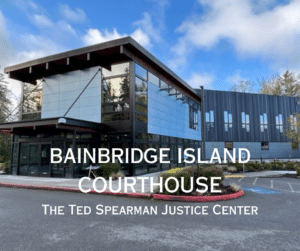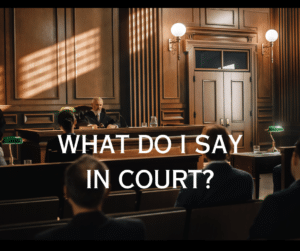Why So Many Orders?
While the words “no contact” “protection” and “restraining” seem to mean the same thing, they actually relate to very specific types of cases and courts.
No Contact Orders
If you hear the words “no contact order,” you better perk up! The reason this type of order is so scary is that it means a criminal charge is involved. The person being told to “stay away” has been arrested and likely facing a formal criminal charge from the prosecutor.
No contact orders are only handled in criminal courts. If you have a no contact order in place, you should know that you have a pending (or soon to be) criminal charge. You may be receiving a Summons for court soon but, in the meantime, you need counsel. Get an experienced criminal defense attorney to represent your rights immediately so you do not accidentally violate the order.
Types of No Contact Orders
Typically, in criminal courts, the prosecutor and defense attorneys do not differentiate the no contact order (NCO) by type. However, to be precise, you could define the order as a Domestic Violence NCO, Harassment NCO, or a Sexual Assault NCO.
The Domestic Violence NCO is a bit different because it does not indicate the actual crime but pertains to the relationship of the alleged perpetrator to the alleged victim. Domestic violence is not an actual crime and is considered a “special allegation.” For example, you might be charged with Assault Fourth Degree – Domestic Violence.
How Long Do No Contact Orders Last?
While the case is pending, a no contact order will be in place. In fact, the no contact order can remain in place indefinitely – even after the criminal case is resolved through trial or negotiated resolution.
When an alleged victim does not feel like a victim and appears at the defendant’s arraignment to request the no contact order be modified or rescinded, the judge will deny this in 99% of cases. The prosecutors and judges are trained to believe that it is normal for a victim of domestic violence to recant statements or try to protect the abuser to avoid more serious abuse in the future.
So, regardless of circumstances (shared children, housing situation, finances, etc.), the judge will not lift the no contact order. If the defendant is released from jail, he or she may not return to the home shared by an alleged victim or have any form of contact. This also means you can not use friends, family, or strangers to relay messages and you cannot use social media to send images, words, or any format that could be construed as a message.
A violation of a no contact order means mandatory arrest and a new criminal charge.
Protection Orders
This is where things get tricky! Protection orders are generally in place when there is no pending criminal case. However, in many cases, a person will seek a protection order prior to a situation where law enforcement gets involved. Then, later, when a criminal act occurs a no contact order is then requested by the prosecutor. So, there could be both a protection order and a no contact order.
If you are seeking a protection order, this can be done on your own. You could seek the guidance of a civil attorney to help you but it is not necessary. If there ends up being both a protection order and a no contact order, a criminal defense attorney is only involved or counseling on the no contact order and that counsel is for the defendant.
Types of Protection Orders
Domestic Violence Protection Order
Sexual Assault Protection Order
Anti-harassment Protection Order
Stalking Protection Order
Vulnerable Adult Protection Order
Extreme Risk Protection Order
Foreign Protection Order Information
Canadian Domestic Violence Protection Order
Our firm does not assist in seeking or defending protection orders. Sometimes, attorneys who practice in family law or general civil litigation will assist with petitioning for a protection order. Most petitioners do not have legal representation. Court staff can usually advise on how to fill out the petition forms but may not provide legal counsel (this is against the law).
If you need information on any of the protection orders, you can reach out to the court where you live or the incident occurred. You can find the laws on these orders by reviewing the Revised Code of Washington 7.105 as well as other related criminal codes.
Types of Restraining Orders
Family Law Restraining Order
Abused Child Restraining Order
The primary difference between Protection Orders and Restraining Orders is that a Restraining Order is requested in an existing domestic case. The type of cases that might involve a RO would be a divorce, custody, child support, or paternity case.
If there is no domestic relationship, the equivalent type of order would be the anti-harassment or stalking protection orders.
The Superior Court judge handling the family law case would issue the Restraining Order. However, these orders are still enforced by law enforcement and violation of the order can result in arrest and a criminal charges. If criminal charges are brought following a RO violation, a criminal no contact order will be put in place by the judge presiding over the criminal case. Every additional violation of a court order will result in additional criminal charges.
Jurisdiction
As you can see, the type of order will depend on the relationship between you and the respondent/defendant, whether a criminal case is pending, as well as the nature of the respondent’s/defendant’s behavior. It might also depend on where you live and what is available in your area. For the most part, if you seek protection but use the wrong type of order (i.e. a family law restraining order is more accurate but, instead, you seek domestic violence protection order), the judge will typically still put the order in place.
Service
Be sure you follow all of the necessary service of process rules so the respondent have been given legal notice. If not, the judge may not allow the temporary or the permanent order. Contact the court clerk’s office where you plan to petition for the order and ask if they have information regarding rules for proper service.
No Contact Orders & Criminal Charges
Witt Law Group attorneys provide expert legal counsel for those who have been accused of crimes and are managing the consequences of a no contact order in Washington state. More often than not, our client’s partner, the alleged victim, did not intend for an arrest to happen. It is very common in heated family disputes for someone to call 911 so they have an “arbiter” in their argument. This is not the function of law enforcement. And, based on Washington’s Mandatory Arrest Law, one of the individuals in the dispute is very likely going to be arrested. In the vast majority of our cases, this is how the domestic violence criminal charge gets started — by mistake.
If you or a loved one is facing a criminal case with the special allegation of domestic violence, please give our office a call right away. Unlike many other criminal charges, there are proactive steps you can be taking right now to shorten the no contact order. However, you need the advice of a very experienced defense attorney, who has handled hundreds or thousands of domestic violence cases, to give you a plan and a path for success. We are here to help 7 days a week. (360) 792-1000

Get help now
Whether you choose to handle your case alone or engage the Witt Law Group, being informed and prepared is essential. Early involvement of an attorney can significantly impact your chances of a fair recovery, allowing you to focus on healing while we handle negotiations with insurance adjusters to secure fair compensation for your injuries.




